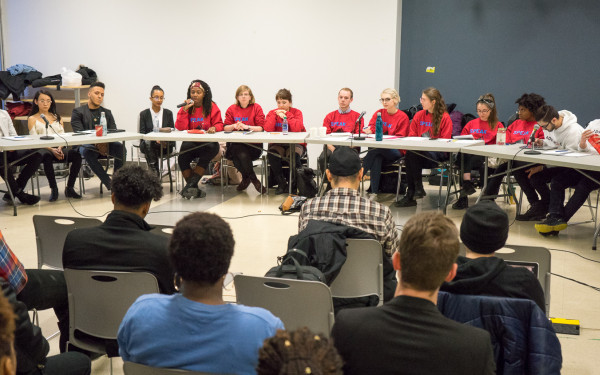Election Results in First Two-Slate Executive in CSU History
Equal Split of Embrace ConU and Team Connect Members Elected
When the votes for the Concordia Student Union elections were counted, and then recounted again, four members from Team Connect and Embrace ConU were left standing.
Even after the recount, which is required by CSU’s standing regulations if the margin of victory is less than 50 votes, the results were the same.
This year marks the first time that the elected executive team will be made up of two competing slates.
“This was inevitable, it was a matter of when it would happen,” said outgoing CSU General Coordinator, Lucinda Marshall-Kiparissis. “[There’s] a first time for everything.”
This year’s elected individuals aren’t worried about the divide. Omar Riaz, the CSU General Coordinator-elect who ran with the Embrace ConU slate, stressed the fact that they’re all a part of one team now.
“I’m going to meet the candidates of Connect that won just to tell them that I was running with a team but right now I no longer represent Embrace ConU,” he said. “We had a platform that I would still like to bring forward but it’s nothing, other than one of two points, that clashes with that of Connect.”
Riaz added that there was no animosity between the two teams during elections and saw it as a “friendly competition.”
“I don’t think working with them will be an issue,” said Veronica Rydzewski, the Internal Affairs Coordinator-elect from Team Connect. “We’re going to meet beforehand and talk about our visions and what we want to accomplish.”
“I’m very excited to work with them,” Rydzewski added.
“The folks that get in do have to act as a team especially since [the CSU has] been moving in a direction of non-hierarchy,” Marshall Kiparissis said. “In the past year and a half, that’s been formalized.”
With the bylaw changes in the most recent elections, the general coordinator’s powers are to be dispersed to the rest of the team. The general coordinator will also now require at least three other executives to sign off on decrees. Before the changes, the general coordinator could issue a decree by themselves without council approval.
“The CSU has been as close to non-hierarchy as we could get it to be,” Marshall-Kiparissis added.
Before 2011, students would vote for slates, which were made up of both executives and councillors, instead of individuals.
“The slate system has to go,” Lex Gill, CSU President during the 2011-2012 academic year, told The Link right after her victory in March 2011. Gill was president before the CSU made their change to become a non-hierarchal team. “It creates a winner-takes-all system, it pits people who would normally be working together against each other over normally small differences of opinion and tactics.”
Since Nov. 2011 and during Gill’s time as president, bylaw changes that were passed in referendum abolished the slate system in CSU elections. It gave the student body the ability to vote for whomever they wanted, regardless of their slate.
The new system was first used in March 2012, and is still in use today.
Since the changes were made, single slates have been sweeping the elections.
In 2012, it was A Better Concordia; CSYou won in 2013; in 2014, Community Matters was the choice; 2015 was Community Action’s year, and in 2016 Act Together won all the positions.
Winners and Losers
”The reality of having elections is sometimes you lose,” Thomas David-Bashore, the outgoing Finance Coordinator said.
David-Bashore, who was running with Team Connect, was denied a second term as finance coordinator by a narrow three-vote margin in this year’s election to Soulaymane Al Alaoui.
He added that he didn’t think that Team Connect campaigned hard enough because it seemed like the votes were on their side during campaigning period.
“If we went out to talk to people who didn’t know what was going on very well, they knew about our team,” David-Bashore said. “They didn’t know about the other team because we had a lot of on the ground mobilization.”
This year’s Chief Electoral Officer, Stephani Moukhaiber said that 1074 students voted this year. 30 per cent of those voters were from undergraduate students enrolled in the John Molson School of Business, a number that she said was “unheard of.”
Riaz thought that the JMSB vote was very important, but said that Concordia students wanted a change in the CSU.
“People wanted an alternative, someone that was a little different in the way that they did things,” he said. “I think that’s what led to the results that we got.”

_900_600_90.JPG)

_600_375_90_s_c1.jpg)
_600_375_90_s_c1.jpg)
_600_375_90_s_c1.jpg)
